
Queer parents need everyone’s support, not people calling us ‘breeders’
A recent book called The Queer Parent, written by Lotte Jeffs and Stu Oakley, calmly opens with the line: “Ninety per cent of queer parenting is simply… parenting”. It’s a fair point. Whether you’re male, female or non-binary, single or partnered, and regardless of your sexuality, all of us who parent aim to meet the exact same needs for our children, day in, day out. The title caught my attention because I think there’s something very timely and profound about the act of being a gay or queer parent today. It’s doing the work that many (dare I say most) people want to see in society – namely raising a new generation of non-toxic humans, making the world a happier place to be different – but in the slow grind of parenthood, not just in the quick flash of activism. I really believe gay and queer parents are changing the world, in a very deep yet unsexy way. Mum and mummy being at the school gate, dad and daddy collecting a child from nursery, or as we’ll get into, dad giving birth to a baby son or daughter. They’re changing the world by being active, visible and engaged parents. But there’s a slightly awkward, under-discussed aspect to this that has truly got under my skin in the eight years since I’ve been a parent. I’m pansexual, so I fancy men as well as women, non-binary people and pans. But oddly I’ve always been frightened to talk about parenthood with most of my avowedly gay male friends – because I’m never quite sure if anyone’s going to derogatorily refer to me as a “breeder” or not. It’s hard to know how well-known the term “breeder” is. I personally used to hear it a lot more back in the mid-Noughties when I was in my early twenties. It’s essentially a slightly bitchy term that’s interchangeably derogatory to people with kids and/or straight people as a whole. As a word, it’s a pretty effective zinger. Straight people have tended to use sexual imagery to define and denigrate gay people. It seems fair that gay people would do the same to heterosexuals. “Breeder” reduces the pleasures of sex to a slightly dehumanised process. In fact, unconnected to sexuality, Gulliver’s Travels author Jonathan Swift used the term to reduce people to a brutal, almost farmyard functionality in a satirical essay from 1729. It’s important to establish that I’m not here to spank gay men on the bum. Neither am I here to accuse them of “heterophobia” either – which I’ve put in quote marks because I’m dubious that it can even exist as a concept. If I was an exclusively gay guy, I might robustly define my sexuality against heteronormativity in ways which could be punchy and sharp. I might also – by virtue of a lifetime of homophobia and trauma that may have started in the home as a child – have latently negative views about the whole concept of family. But I am who I am now, and despite understanding all this, I’m still getting weary of it as a trope, and also as a reason not to talk about the many genuine ecstasies of parenthood. I like being a dad and I like dating guys. These things shouldn’t be so controversial – yet weirdly, I find it’s gay men who have more slack-jawed incomprehension of these two facts than any other group in society. My own personal beef is very trifling in the scheme of things, however. The much bigger picture is that – newsflash – gay, queer and trans people have kids. Loads of them. While data is limited, there was a 40 per cent rise in same-sex parents from 2015 to 2019. Anecdotally, it seems to be a much greater phenomenon than is reported. The same goes for the rarely examined hardships LGBT+ people typically go through to even have kids: namely the incredible anguish of IVF and the epic emotional journey of surrogacy. You’d expect increased visibility of gay and queer parents would have phased out the use of the word “breeder” as a pejorative, but weirdly it lives on – especially on TikTok where, perhaps like an unkillable echo of my own twenties, it’s mostly young people using the word as a way of defining their queerness and riling up straights. What makes my heart sink, beyond knowing that a younger generation is using the same dumb-ass words people said 20 years ago, is that this is a really, really bad time to start being unsupportive of gay parents. While queer visibility may feel greater than ever, the world is going backwards in many respects. Even just in the realm of children’s culture, things as harmless as a drag artist reading stories can draw an angry mob of culture warriors – as happened at Tate Britain in London in February. Look at Florida – once the home of fictional queer icons The Golden Girls, now home to Republican governor and presidential hopeful Ron DeSantis – and you’ll see books with titles as benign as This Book Is Gay banned as a result of his vociferously “anti-woke” legislation. We all know that creating this type of hostile environment will surely result in more bullying, more hatred, more lives blighted. While queer visibility may feel greater than ever, the world is going backwards in many respects It’s pathetic, cruel yet grimly successful at the same time. With every small news story or stunt, a palpable hostility festers. Thus anything that drives a wedge between gay/queer people and parenthood is a bad look right now – especially with elections looming in the US and Britain that I fear will see the issue of gender identity playing a huge, calculatedly divisive role. What better way to rebuff this negativity than by strongly standing up for gay and queer parents. Specifically, we could start standing up for men having babies. Trans men like the British journalist Freddy McConnell who a few years back gave birth to a child who seems to be doing great (and likes a good splash in the sea), or Iowa-born Tanius Posey, who thankfully was able to breastfeed his child despite simultaneously getting online abuse for it. Logan Brown, also from the UK, is a trans man who has been documenting his pregnancy over the past few months with genuine clarity and candour. He gave birth to his daughter Nova just over a week ago. Celebrated gay NYC artist Keith Haring frequently placed a baby into his work, a shining symbol of hope and playful optimism for the future. Maybe in the same spirit as Haring, we could all do with a new beginning in our attitudes to gay and queer parenting, inspired by a rather miraculous baby such as Nova. Read More How OCD can destroy relationships: ‘I had the obsessive fear that I might cheat’ Women with body hair remain a cultural taboo, and I can’t see it changing Flip-flops, nudity and ‘up the vajayjay!’: How the red carpet became a platform for protest
2023-05-30 14:27

Uganda enacts harsh anti-LGBTQ law including death penalty
KAMPALA Uganda's President Yoweri Museveni signed one of the world's toughest anti-LGBTQ laws, including the death penalty for
2023-05-30 02:21
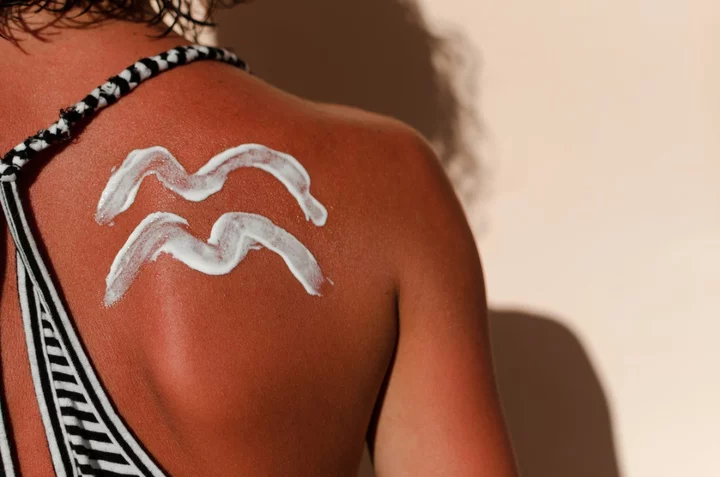
The truth about applying after-sun on sunburnt skin, according to the experts
After the UK recorded its hottest day of the year on Sunday, with some parts of southern England reaching 31C, many could be waking up with sore, sunburnt skin today. Taking care of your skin after excessive sun exposure is incredibly important, as failing to do so could lead to long-lasting damage. However, if your first course of action after sustaining a sunburn is to immediately buy and apply after-sun, then you may not be doing an adequate job. According to the experts, applying after-sun could do your skin even further harm if you don’t take a thorough look at the ingredients. That’s why it may be a wise idea to opt for an aloe vera gel instead. “After-sun formulas tend to have rich, thick consistencies containing oils, which create an emollient barrier on top of the skin trapping in the heat in the upper layer of the epidermis and exacerbating the inflammation and ‘burn’ feeling on your face,” Michaella Bolder, Time Bomb skincare expert tells to The Independent. “Plus, many over the counter after-suns will contain chemicals and/or fragrance. This will just irritate the damaged skin!” Aloe vera has been highly regarded for a very long time due to its remedial properties, Lorraine Shrivener, director of Eden Skin Clinics, explains. “Aloe vera has been a trusted skin saviour for many years,” she says. “With its immediate cooling effect to the skin, it’s a firm favourite for post-suncare.” According to Ms Shrivener, aloe vera is most potent when attained as a pure, clear gel. While gels allow heat to escape from the skin, thicker creams that have been designed to lock in moisture could trap heat within the skin, making it feel cooler rather than hotter. However, as medical director of CosmedicsUK and GP Dr Ross Perry points out, the medicinal properties of aloe vera have not technically been affirmed by scientific research. “Aloe vera is a traditional herbal remedy believed to reduce sunburn symptoms,” he explains. “There is no scientific evidence in support of its use for sunburn, but anecdotal evidence is that it is soothing and safe and can feel cooling.” Aloe vera is a plant species that can trace its origins to the Arabian Peninsula. Mentions of aloe vera as a curative ingredient can be found in the Ebers Papyrus, from 16th Century BC, and in Pliny the Elder’s Natural History, which was written in the mid-first century AD. Despite the supposed lack of scientific evidence to back its use as a treatment for sunburn, many health professionals still recommend it for soothing irritated skin. “Aloe vera is thought to have a myriad of positive effects on skin, especially sunburnt skin,” says Dr Natalie Spierings, consultant dermatologist at Dermatica. “True clinical effectiveness has yet to be established. But aloe vera is not harmful and it might aid in helping calm down sunburnt skin, so it is worth giving it a try.” While some skincare experts would advise opting for a clear aloe vera gel instead of a heavier, moisturising after-sun when treating sunburn, others would suggest simply finding an after-sun that contains the plant. “After burning the skin you should think cool and repair,” says Ms Bolder. “The best way to do this is to apply a formula with a high water and high aloe vera content - the more natural and gentle the better! “Aloe vera has quite impressive cooling, healing and antiseptic properties so will beat a generic after-sun every time.” Using an after-sun can still be beneficial if you make sure that the ingredients are gentle and natural as possible. However, if you’re not entirely sure of whether a specific after-sun will do more harm than good, then going for a clear aloe vera gel would likely be your safest option. With around 16, 200 new cases of melanoma skin cancer reported in the UK every year, according to Cancer Research UK, looking after your skin is of the utmost importance during the hotter months. Dr Vikram Rajkomar, a consultant dermatologist at Pall Mall Medical who specialises in the treatment of skin diseases and skin cancer, recommends speaking to a consultant dermatologist as soon as possible if pain caused by sunburn persists. Read More The truth about applying after-sun on sunburnt skin, according to the experts Mum’s warning after viral TikTok hack left skin peeling from her face TikTok Influencer hospitalised for after horse falls on her at Arizona ranch Teenagers are increasing their chances of cancer with 'sunburn art' Europe heatwave: Tourists warned as temperatures set to soar
2023-05-29 21:16
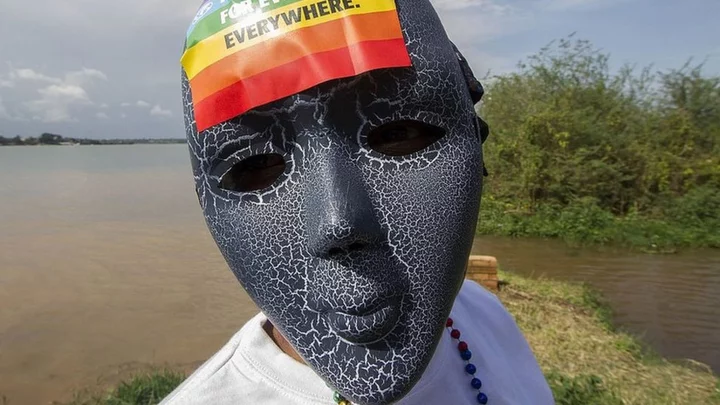
Uganda's President Museveni approves tough new anti-gay law
UNAids and the US warn that Uganda's progress in tackling HIV is now in "grave jeopardy".
2023-05-29 20:56
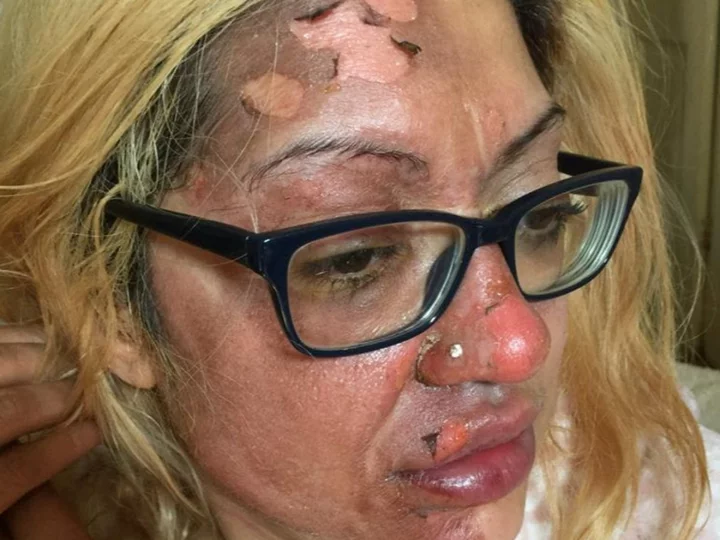
Mother’s warning after viral TikTok hack left skin peeling from her face
A terrified mother has warned against cooking eggs in a microwave after the viral TikTok ‘hack’ exploded and left her skin pealing from her face. Shafia Bashir, 37, said she’d been in “absolute agony” after making a poached egg using a much-publicised recipe available on the internet. She’d first poured some boiling water in a mug before adding the egg and then put it in the microwave for a couple of minutes until it had cooked. But when she put a cold spoon on the egg, it erupted “like a fountain” and scolded the right side of her face - leaving her in the “most excruciating” pain of her life. Shafia went to A&E where her burns were treated, but she said they were still stinging 12 hours after the incident. And though her wounds have now healed, the mum-of-one has still cautioned others to think twice about attempting the popular dish. She said: “I just don’t want anyone else going through that, because it is trending on TikTok…It was the most excruciating pain in my life. “It was a terrifying time for me. I was in absolute agony. “As soon as I put the cold spoon in, it exploded like a fountain and it scolded me. “I put my face under the tap and then had to get my mate to look after my daughter so I could go to A&E. “My face has healed now, luckily with no scars. I used Vaseline, Sudocrem, whatever I could get my hands on.” Shafia, from Bolton, Grtr Manchester, said she had been making the dish for three years when she’d decided to cook it on May 12 while feeling “starving” She had followed a recipe that her ex-mum-in-law had taught her, but on this occasion, she was left stunned when the cooking trick ended in disaster. She said: “I did it exactly the same as I usually do it. I had already made the toast, I was starving! “My ex-mother-in-law told me about it. She told me how to make a poached egg in the microwave. I had been doing it for three years. “I boiled the kettle, half-filled the mug with water, put salt inside, the egg inside, and microwaved it for a minute. It wasn’t cooked, so I put it in for another minute.” “After it happened, I put my face under the tap for 20 mins. But the burning lasted for 12 hours. It just didn’t stop.” The British Medical Journal previously said that microwave ovens should display clear warnings about exploding eggs. Cooking shelled eggs in a microwave is dangerous because the casing holds in heat. Once you have removed the egg from the microwave, it will carry on cooking itself and any disruption can cause an explosion. But similar dangers can apply when cooking sunny side up or poached eggs in the microwave. These cooking hacks proved popular on social media sites such as TikTok, as people look for ways to save time with everyday tasks. But it’s not the first time the trick has gone wrong, with Chantelle Conway, from Farnworth, claiming a similar thing happened to her in 2021. Shafia said she had been left traumatised after the incident and vowed never to eat an egg again. But she has also seen the funny side of her experiences and made light of them to her 15,000 followers on TikTok. Shafia said: “For my last videos on TikTok, I did Beauty and the Beast and Tony Montana from Scarface, with the burn. “My followers thought it was a filter!” Read More Woman sparks debate by documenting busy last day at work after being fired: ‘Just leave’ Selena Gomez ‘yells’ at security guard at Beyoncé’s Renaissance tour Mother hit with deluge of abuse for taking toddler’s packed lunch to a restaurant Schoolboy almost dies from swallowing magnets for TikTok challenge Woman shares honest review of New York City apartment TikTok mom slammed after making 5-year-old son run in 104 degree heat
2023-05-29 20:46

Special Report: Dozens of babies die in orphanage as Sudan war takes grim toll on Khartoum
By Maggie Michael In the days after war erupted in Khartoum, Dr Abeer Abdullah rushed between rooms at
2023-05-29 16:20

Bruce Willis’s wife Emma credits nine-year-old daughter with important health tip
Bruce Willis‘ wife Emma Heming Willis has shared an emotional story about how their nine-year-old daughter, Evelyn, has tried to help her father as he suffers from dementia. Heming Willis, 44, shared a series of videos to Instagram on Monday (22 May), with the story about how the youngest child of the Die Hard actor, 68, was researching information about her father’s disease. Willis’ family shared an update in Febuary announcing the actor’s aphasia condition – when a person has difficulty with their speech and language – had developed into frontotemporal dementia. “So, I have to tell you this story, and I’m gonna try to do it without crying, ‘cause when Evelyn told it, I was an absolute puddle,” Emma told her Instagram followers on Monday. Evelyn told her mother that people living with dementia can suffer from severe dehydration. Hemming Willis asked her how she learned that, and said Evelyn told her that she was looking up “fun facts about dementia” during some free time at school. “Now that’s not funny, but it’s kind of funny, and she really is her father’s child, because these two love some random facts,” Emma said. Hemming Willis expressed that she was proud of her daughter for her empathy for her father’s condition and her curiosity to learn about it. “I said to her, ‘Evelyn, we will always make sure daddy has a bottle of water in hand.’” According to Alzheimer’s Society, a person with dementia may become dehydrated if they’re unable to communicate or recognise that they’re thirsty, or if they forget to drink. This can lead to headaches, increased confusion, urinary tract infections and constipation, making the symptoms of dementia worse. Hemming Willis said she told her daughter: “That is the most loving and compassionate thing that you can do is to be curious and educate yourself on your dad’s disease.” She added that it is important for caregivers, friends and family to educate themselves on the disease of their loved ones so they can “support them in the best way possible”. Hemming Willis concluded the video by saying: “So keep educating yourself, stay curious and remember to hydrate your loved ones.” The Make Time Wellness founder has continued to raise awareness about dementia since her husband’s diagnosis earlier this year. She often invites dementia practitioners and health experts to join her for discussion on Instagram Live to raise awareness of the disease. She is also mother to daughter Mabel Ray, 11, whom she shares with the Pulp Fiction star. The pair have been married for 14 years. Willis has three older children from his previous marriage to Demi Moore; Rumer, 34, Scout, 31 and Tallulah, 29. Read More Woman defends picking up ‘$8k’ sofa from New York street Couple with 37-year age gap who met when he was 15 have hopes dashed Elle Fanning wows fans with daring cut-out dress at Cannes: ‘My nips could never’ Bruce Willis’s wife Emma credits nine-year-old daughter with important health advice Bruce Willis’s wife shares update after actor’s dementia diagnosis ‘Suddenly, I saw Dad again’: The radical tech helping those living with dementia
2023-05-29 00:54
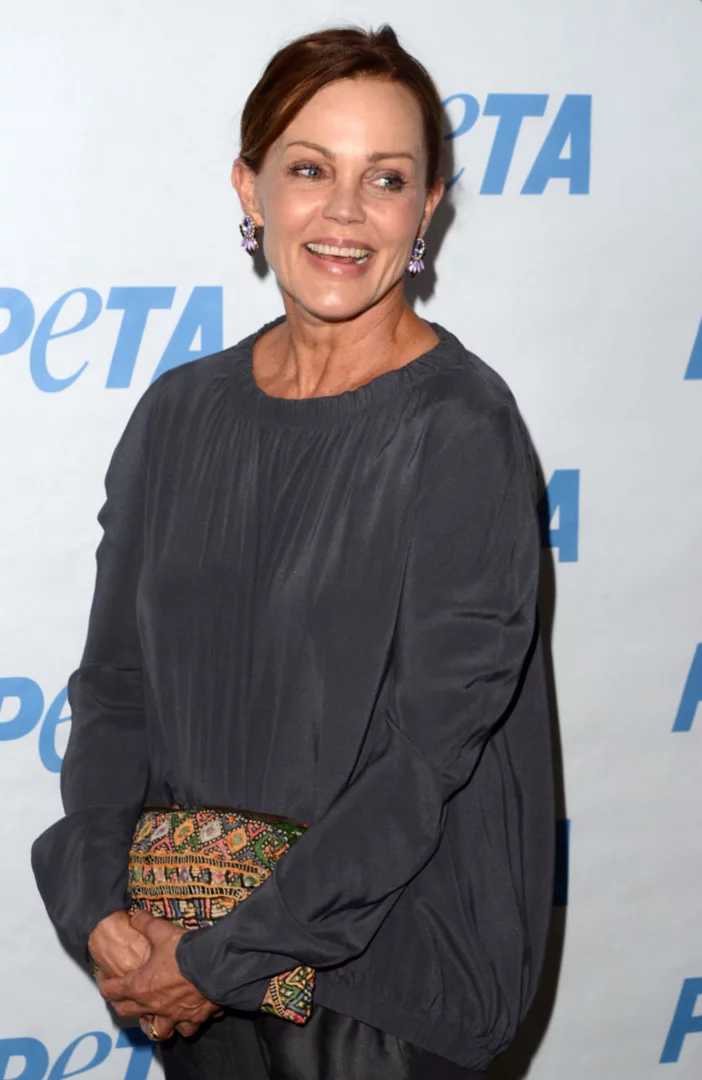
'I was ready to slow down!' Belinda Carlisle talks music comeback
Belinda Carlisle was unsure whether she wanted to return to music before
2023-05-28 15:19
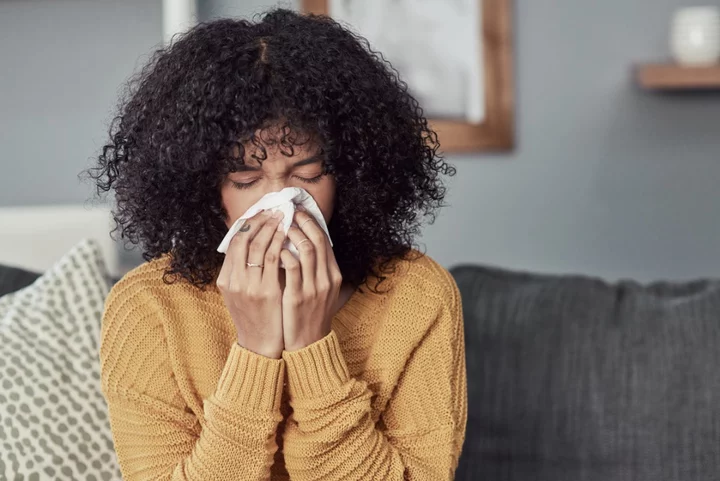
Pharmacist warns against one common hay fever habit that could lead to more serious eye problems
A pharmacist has said that frequently rubbing your eyes can lead to more serious eye issues. Symptoms of hay fever, which is an allergic reaction to pollen, include sneezing, coughing, rashes, blocked noses, headaches, and itchy red eyes meaning it is natural to want to touch and rub your eyes in moments of discomfort. But community pharmacist Sultan Dajani, from eyecare brand Golden Eye, told The Mirror how allergies can cause more serious eye problems. Dajani said: "When we encounter an allergen, either from inhaling, swallowing, or simply by the skin coming into contact with it, the body goes into fighting mode and the immune system overreacts to the substance. "A protein known as IgE is produced to go after the allergen, and a chemical called histamine is released into the blood – and it is this that creates the symptoms commonly experienced. "So, in fact when we have these types of symptoms the body is functioning and doing its job to get rid of the allergen. "Though we need our body to react in this way, the symptoms themselves can really affect our general wellbeing, lowering our immune system and interrupting everyday activities." Dajani explained that frequently touching our eyes can open up the possibility for further eye problems or infections such as styes, conjunctivitis, or blepharitis. "Our hands come into contact with most things, from people to surfaces, making it easy to transfer bacteria and germs to our faces – and if we are reaching for our eyes, it’s easy for a simple rubbing of the eyes to develop into something else." Issues that could arise from this include a stye, which is a swollen lump on the eyelid or near the eyelashes. Dajani explained: "People tend to get more styes during allergy season. Allergies are known risk factors for styes. With the experience of itchy eye symptoms it can feel impossible not to rub them. One problem that could also be related to rubbing eyes is conjunctivitis, which is an infection of the eye often caused by a virus or bacteria. Blepharitis, when oil glands near the base of the eyelashes become clogged, leading to irritation and redness of the eyes, can also be triggered by continuous touching or rubbing of the eyes, Dajani said. Read More Why do we get hay fever and what are the symptoms? Should I keep my windows closed or open in hot weather? What is Stiff Person Syndrome? Signs and symptoms of Celine Dion’s incurable condition The symptoms of hay fever in adults explained 7 tips and tricks for hay fever relief Bear Grylls urges parents to let their children ‘set own rules’ on social media usage
2023-05-28 00:22

Bear Grylls urges parents to let their children ‘set own rules’ on social media usage
Celebrity adventurer and chief scout Bear Grylls has said that children need to learn to “police” themselves and manage their own time on social media. Speaking on stage at the annual literature event Hay Festival in Wales, Grylls said that children should learn to self-regulate how much they use the internet, and how they use it. His comments were made after a child in the audience asked for his thoughts on the power of social media. “Social media can be brilliant, it really can,” he said, via The Times. “The brilliant side of it is that it connects us, and you can learn stuff so fast and you can have fun and it’s brilliant entertainment.” He continued: “The key, though, is not letting it control you. You control it. So you be in charge.” The celebrity adventurer warned the audience against permitting social media to “erode you”. He said: “If I’m on it all day, that’s going to erode your heart a bit.” Grylls added that he and his wife, Shara Grylls, did not set rules how long their three sons – Jesse, 19, Marmaduke, 17, and Huckleberry, 14 – are allowed to spend on social media. “I say ‘Set your rules’,” he said, adding: “You’re in charge because after you leave school nobody’s going to be policing it for you.” “You’ll have to police your own life. That might be eating healthy, or going to the gym, or if somebody treats you badly in a relationship then having some boundaries and saying: ‘No – I’m not going to let you’. You’ve got to police yourself with social media as well.” The Man Vs Wild star added that he is concerned that children are sometimes “lost” in the world of their smartphones, and encouraged parents to teach their children “practical skills” because they may not be equipped later in life. “I meet many big, strapping men who will say to me: ‘I really want to learn how to tie this simple knot – I feel a bit inadequate that I can’t tie the roof rack on properly,’” he explained. Read More Mother hit with deluge of abuse for taking toddler’s packed lunch to a restaurant Nick Cave says he was ‘extremely bored’ at King Charles’s coronation Ivy walls, gilded sofas and one very diva plaque: Inside Tina Turner’s ‘cartoon palace’ in Switzerland
2023-05-27 20:48

U.S. FDA approves Lexicon Pharma's heart failure drug
(Reuters) -The U.S. Food and Drug Administration (FDA) has approved Lexicon Pharmaceuticals Inc's drug as a broad treatment for heart
2023-05-27 04:54

Thailand media guide
An overview of the media in Thailand, including links to broadcasters and newspapers.
2023-05-26 23:56
